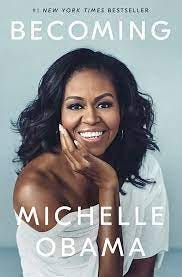What shook me most was that I had no concrete ideas about what I wanted to do. Somehow, in all my years of schooling, I hadn’t managed to think through my own passions and how they might match up with work I found meaningful.
Step #1: Notice
In 1989, when Michelle Robinson met Barack Obama, he was her intern.
After graduating from Harvard Law School, Michelle had gotten hired by the law firm Sidley & Austin in Chicago. A year later, she was assigned a promising young man who would soon be the president of the Harvard Law Review. The two ended up falling for each other by the end of that summer.
A lot would come from that fateful pairing, of course. But the most immediate thing that arose caught Michelle off guard.
This was no ordinary guy—it was Barack Obama. A man with a drive, with a purpose, with a seemingly unshakeable set of values.
He steered himself with a certainty I found astounding.
There’s something innately bolstering about a person who sees his opportunities as endless, who doesn’t waste time or energy questioning whether they will ever dry up.
But Michelle also found it disconcerting.
All this inborn confidence was admirable, of course, but honestly, try living with it.
In the presence of his certainty, his notion that he could make some sort of difference in the world, I couldn’t help but feel a little bit lost by comparison. His sense of purpose seemed like an unwitting challenge to my own.
This ‘lost’ feeling set off a course of events, leading to one of the very best ideas in Michelle’s great book, Becoming—the source of today’s OGT.
Step #2: Write
To help her process the situation, Michelle started journaling.
“On the very first page, in careful handwriting, I spelled out my reasons for starting it: One, I feel very confused about where I want my life to go. What kind of person do I want to be? How do I want to contribute to the world?
She knew one thing for sure, she was unhappy where she was. “The first thing was that I hated being a lawyer.”
She knew what she didn’t want. But what about what she did want?
What shook me most was that I had no concrete ideas about what I wanted to do…Somehow, in all my years of schooling, I hadn’t managed to think through my own passions and how they might match up with work I found meaningful.
Here answer: start by making lists. A no pressure, no-right-answer activity where she simply bullet-pointed issues she interested in and what she cared about.
"Could I be a teacher? A college administrator? Could I run some sort of after-school program..? I was interested in possibly working for a foundation or a nonprofit. I was interested in helping underprivileged kids. I wondered if I could find a job that engaged my mind and still left me enough time to do volunteer work, or appreciate art, or have children. I wanted a life, basically. I wanted to feel whole."
At first, all of this writing and thinking led to little action. A year after this journal scene, she still hadn’t done much.
It took a life-shaking moment—her dad passing away—to jolt Michelle into action.
My father was just fifty-five when he died. Suzanne (her friend who had recently died) had been twenty-six. The lesson there was simple: Life is short and not to be wasted.
I felt certain I had more to offer the world. It was time to make a move.
Step #3: Act
She started with her lists—all of those issues, potential industries and jobs she might be interested in. Then she acted.
She wrote letters to people in high positions that in any way resembled the jobs on the lists. And then she sent them out in droves.
I sent them to people all over the city of Chicago. I wrote the heads of foundations, community-oriented nonprofits, and big universities in town, reaching out specifically to their legal departments—not because I wanted to do legal work, but because I figured they were more likely to respond.
Thankfully, a number of people did respond.
She took meetings and lunches, calls and coffees with anyone that would have her. These didn’t really lead to jobs, but more to understanding. Which was key.
The point was less to find a new job than to widen my understanding of what was possible and how others had gone about it.
Michelle went from meeting to meeting, getting advice from people, asking questions, and often finding herself pointed to someone else. It was a slow process, but it seemed to be working. Things were happening.
Eventually, she landed an interview with Valerie Jarret— former corporate lawyer in whom Michelle saw herself.
Jarrett was the deputy chief of staff for the Mayor of Chicago. Michelle was offered a job on the spot. But she didn’t take the job right away.
She asked everyone she knew for advice. Most people advised her to stay in the cush corporate law job.
All except for that strong-willed, wide-eyed boyfriend of hers.
Barack believed and trusted when others did not. He had a simple and buoying faith that if you stuck to your principles, things would work out.
He was the lone voice telling me to just go for it, to erase the worries and go toward whatever I thought would make me happy.
It was ok to make my leap into the unknown, because—and this would count as starling news to most every member of [my family]—the unknown wasn’t going to kill me.
Not long after she confided in Barack, he asked her to marry him at dinner one evening. The waiter served Michelle’s dish, and in place of a steak, was a velvet black box.
I said yes to Barack, and shortly after that I said yes to Valerie Jarrett, accepting her offer to come work at city hall.
The OGT
To me, the Good Think here is three-fold.
It’s common, even for the elite. It’s about the fact that even a Princeton-to-Harvard-Law grad with a great job in a high-rise who just met the love of her life can feel off-track. When I read that, it somehow encouraged me. That it happens to everyone—even Barack. In a later OGT, we’ll look at Barack’s, Dreams of my Father, and see how even future presidents waiver.
Her method is copyable. It was practical, it was messy, it took longer than she probably wanted, and at times it was frustrating, but her method— journaling, making lists, thinking, writing letter, taking meetings, talk to people for advice, and deciding—it worked, and it’s very repeatable.
Do what you believe. There’s a saying in finance: “You can either eat well, or you can sleep well.” Michelle largely dealt with this trade-off—staying at the high-paying job (eating well) or going with what she believed in (sleeping well). Barack helped her realize what she already knew— go for sleep, and maybe that leads to good eating.





